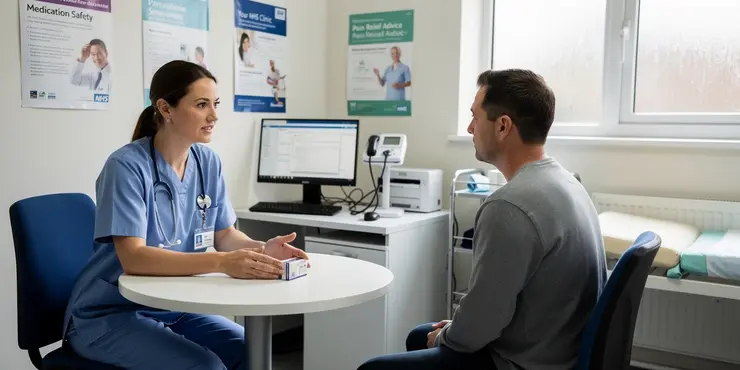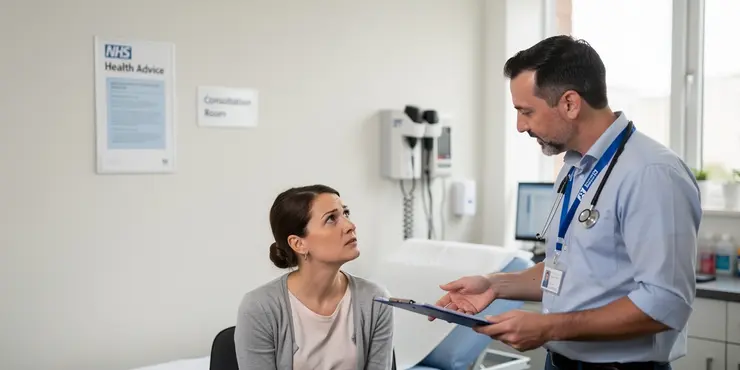
Find Help
More Items From Ergsy search
-

Can Paracetamol be used in pregnant women?
Relevance: 100%
-
Can pregnant women get chickenpox?
Relevance: 64%
-

Can pregnant women take Baxdrostat?
Relevance: 63%
-

What should pregnant individuals consider when taking paracetamol?
Relevance: 62%
-

Can pregnant women get the flu vaccine?
Relevance: 61%
-

Is there any scientific evidence that links paracetamol use to autism?
Relevance: 57%
-

Is paracetamol linked to autism?
Relevance: 56%
-

What precautions should pregnant women in the UK take regarding Zika virus?
Relevance: 53%
-

Why is there concern about paracetamol and autism?
Relevance: 53%
-

Can pregnant women take Ozempic?
Relevance: 50%
-

Why might someone choose Paracetamol over NSAIDs?
Relevance: 50%
-

What are the side effects of Paracetamol?
Relevance: 47%
-

What is Paracetamol?
Relevance: 45%
-

What is Paracetamol?
Relevance: 45%
-

What is a common use of paracetamol?
Relevance: 45%
-

Is it safe to take Paracetamol with Ibuprofen?
Relevance: 45%
-

Can I take ibuprofen and paracetamol together? - Common Health Questions | NHS
Relevance: 42%
-

Is Paracetamol the same as Aspirin?
Relevance: 42%
-

What is the difference between Aspirin, Paracetamol, and Ibuprofen?
Relevance: 41%
-

Does Paracetamol reduce inflammation?
Relevance: 41%
-

Can I do Pilates while pregnant?
Relevance: 40%
-

Can I do high-impact exercises while pregnant?
Relevance: 39%
-

How prevalent is the use of paracetamol during pregnancy?
Relevance: 39%
-

Which one is better for headaches: Aspirin or Paracetamol?
Relevance: 38%
-

Can pregnant women see a chiropractor?
Relevance: 38%
-

Is it safe to participate in group sports while pregnant?
Relevance: 38%
-

Which one is better for toothache: Ibuprofen or Paracetamol?
Relevance: 38%
-
What is the difference between aspirin, paracetamol, and ibuprofen?
Relevance: 37%
-
Can I get the COVID jab if I am pregnant or breastfeeding?
Relevance: 37%
-

Is there any risk of using paracetamol outside of pregnancy with regard to autism?
Relevance: 36%
-

Is it safe to lift weights while pregnant?
Relevance: 34%
-

Have there been any recent changes in guidelines regarding paracetamol use and pregnancy?
Relevance: 34%
-

Can women use Abiraterone for treatment?
Relevance: 33%
-

Can pregnant individuals receive the meningococcal vaccine?
Relevance: 33%
-

What are women's prisons like in the UK?
Relevance: 32%
-
Have any major health organizations advised against using paracetamol during pregnancy due to autism concerns?
Relevance: 31%
-

Can I get Botox while pregnant?
Relevance: 31%
-

Are there safer alternatives to paracetamol for pregnant individuals experiencing pain or fever?
Relevance: 31%
-

Has paracetamol been linked to other developmental issues besides autism?
Relevance: 30%
-

Are men and women's pension ages equalized?
Relevance: 29%
Introduction
Paracetamol, known as acetaminophen in some countries, is one of the most commonly used over-the-counter medications for relieving pain and reducing fever. It is widely available in the UK and is often the first line of treatment for mild to moderate pain. However, when it comes to using medications during pregnancy, extra caution is advised. This article examines the safety of paracetamol use by pregnant women in the UK.
Paracetamol and Pregnancy
In the UK, paracetamol is generally considered safe to use during pregnancy for relieving pain and fever. It is classified as a Category A drug, which means it has been extensively used by pregnant women without any proven harmful effects on the fetus. However, it is always recommended that pregnant women use the lowest effective dose for the shortest possible duration.
Consulting Healthcare Professionals
While paracetamol is widely regarded as safe, it is essential for pregnant women to consult a healthcare professional, such as a GP or midwife, before taking any medication. A healthcare provider can offer advice on the appropriate dosage and help weigh any potential risks versus the benefits of taking paracetamol during pregnancy. This guidance is crucial, especially for women with underlying health conditions or those taking other medications.
Potential Concerns
Although paracetamol is considered safe, some studies have raised concerns about its prolonged use during pregnancy. Research has suggested a potential link between long-term use of paracetamol by pregnant women and developmental issues in children, such as asthma or attention-deficit/hyperactivity disorder (ADHD). However, these studies are not conclusive, and further research is needed to fully understand these potential effects. Therefore, caution and moderation are always advised.
Recommended Usage
For pregnant women who need to take paracetamol, it is recommended to stick to the standard dosage guidelines: usually 500mg to 1g up to four times a day, not exceeding 4g in a 24-hour period. If symptoms persist, it is essential to seek further medical advice rather than increasing the dosage on one's own initiative.
Alternatives to Paracetamol
Pregnant women seeking alternatives to paracetamol for pain relief should discuss available options with their healthcare provider. In some cases, non-pharmacological approaches such as rest, ice packs, or warm baths may be effective. It is important to consider non-drug methods for managing pain whenever possible to minimize medication use during pregnancy.
Conclusion
Paracetamol remains a widely accepted option for pain and fever management in pregnant women within the UK. When used responsibly and under professional guidance, it is regarded as safe for short-term use. However, as with any medication during pregnancy, it is crucial to follow medical advice and exercise caution to ensure the best possible outcomes for both the mother and the developing baby.
Introduction
Paracetamol is a common medicine used to help with pain and to bring down a fever. In some places, it is called acetaminophen. Many people in the UK use paracetamol when they have mild pain. It is easy to buy from shops. But, if you are pregnant, you need to be careful with any medicine. This article talks about how safe paracetamol is for pregnant women in the UK.
Paracetamol and Pregnancy
In the UK, paracetamol is thought to be safe for pregnant women who need to relieve pain and fever. Doctors think it is okay because many pregnant women have used it without problems. But, it is important for pregnant women to take the smallest amount of paracetamol that helps and to use it for a short time.
Consulting Healthcare Professionals
Even though paracetamol is considered safe, pregnant women should always talk to a healthcare professional, like a doctor or midwife, before taking any medicine. They can tell you how much to take and make sure it is safe for you. This is even more important if you have other health issues or take other medicines.
Potential Concerns
While paracetamol is usually safe, some studies suggest that taking it for a long time during pregnancy might not be good. Some research says there could be a link between using paracetamol often in pregnancy and some problems in children, like asthma or ADHD. But, these studies are not sure yet, and scientists need to do more research. It is best to be careful and not use too much paracetamol.
Recommended Usage
If a pregnant woman needs to take paracetamol, it is best to follow the guidelines: usually 500mg to 1g at a time, up to four times a day, and not more than 4g in one day. If you still feel unwell, talk to a doctor instead of taking more paracetamol on your own.
Alternatives to Paracetamol
If a pregnant woman wants other ways to relieve pain without paracetamol, they should talk to their doctor. Sometimes, resting, using an ice pack, or taking a warm bath can help with pain. It is good to think about these options to avoid taking too many medicines during pregnancy.
Conclusion
Paracetamol is often used to help with pain and fever for pregnant women in the UK. If you use it carefully and get advice from a doctor, it is considered safe for short times. But, like with all medicines in pregnancy, it is very important to listen to doctors and be careful for the safety of both mother and baby.
Frequently Asked Questions
Can pregnant women take paracetamol safely?
Yes, paracetamol is generally considered safe for use during pregnancy when taken as directed.
What is paracetamol used for in pregnancy?
Paracetamol is used to reduce fever and relieve mild to moderate pain during pregnancy.
Is there a recommended dosage of paracetamol for pregnant women?
The recommended dosage for pregnant women is usually the same as for non-pregnant adults, but it is important to follow healthcare professional advice.
Can taking paracetamol during pregnancy harm the baby?
There is currently no conclusive evidence that paracetamol harms the baby when taken in recommended doses.
Should I consult a doctor before taking paracetamol while pregnant?
Yes, it is always advisable to consult a healthcare provider before taking any medication during pregnancy.
Is it safe to take paracetamol in the first trimester of pregnancy?
Paracetamol is generally considered safe at all stages of pregnancy, but consultation with a healthcare provider is advised, especially in the first trimester.
Can I take paracetamol if I have a cold during pregnancy?
Paracetamol can be used to relieve symptoms like fever and headaches associated with a cold during pregnancy.
Is there a risk of birth defects if paracetamol is taken during pregnancy?
Current research indicates that paracetamol poses a low risk of birth defects when used during pregnancy.
What should I do if I accidentally overdose on paracetamol while pregnant?
Seek medical attention immediately if you suspect an overdose, as it can be harmful to both mother and baby.
Can paracetamol be taken with other medications during pregnancy?
Always consult a healthcare provider before combining paracetamol with other medications during pregnancy.
Can paracetamol affect my chances of getting pregnant?
There is no evidence to suggest that paracetamol affects fertility or the chances of becoming pregnant.
Are there alternatives to paracetamol for pain relief during pregnancy?
Some alternatives exist, but the safety of alternatives like NSAIDs is less established during pregnancy, making paracetamol a preferred choice.
Can paracetamol cause miscarriage?
When used as directed, paracetamol is not associated with an increased risk of miscarriage.
Is it safe to take long-term paracetamol during pregnancy?
Long-term use should only occur under medical supervision as it may have potential risks.
Can paracetamol be taken for headaches during pregnancy?
Yes, paracetamol is commonly used to relieve tension headaches during pregnancy.
How often can I take paracetamol while pregnant?
Typically, paracetamol can be taken every 4-6 hours as needed, but not exceeding the maximum daily dosage as instructed by a healthcare provider.
What should I do if paracetamol doesn't relieve my pain during pregnancy?
Consult a healthcare professional for advice and to explore other possible treatments.
Is paracetamol the same as acetaminophen?
Yes, paracetamol is known as acetaminophen in some countries.
Can paracetamol be taken for back pain during pregnancy?
Paracetamol can be used for back pain relief in pregnancy, but it's best to discuss persistent pain with a healthcare provider.
How does paracetamol work in the body?
Paracetamol works by reducing the production of prostaglandins, chemicals in the brain that signal pain and fever.
Is it safe for pregnant women to take paracetamol?
If you are pregnant, it is usually safe to take paracetamol. But, it's always important to:
- Talk to your doctor or nurse before taking any medicine.
- Read the instructions on the medicine box.
- Take the smallest amount that helps you feel better.
You can also:
- Ask a friend or family member to help you read the box.
- Use a reading app or tool to read any hard words.
Yes, it is usually okay to take paracetamol when you are pregnant, if you follow the instructions.
What is paracetamol used for when you are having a baby?
Paracetamol is a medicine that can help when you are in pain or have a fever. Pregnant people can take it if they feel sick or hurt. Always ask a doctor or nurse before taking any medicine when you are pregnant.
If reading is tricky, try these tips:
- Ask someone to read the text with you.
- Use a ruler or finger to follow the words.
- Break the text into small parts.
- Listen to the text using a text-to-speech tool.
Paracetamol can help to make your fever go down and takes away pain if you are pregnant. It can help with small to medium pain.
How much paracetamol can pregnant women take?
If you are pregnant and need to take paracetamol, it is important to be careful. Talk to a doctor or nurse before taking any medicine. They will tell you how much is safe for you.
Here are some tips to help you:
- Always follow the advice of your doctor or nurse.
- Read the label on the medicine bottle carefully.
- You can use reminders, like an alarm on your phone, to help you remember when to take the medicine.
If you have questions, it is good to ask a healthcare professional.
Pregnant women usually need the same amount of medicine as other adults. But it is very important to listen to what your doctor or nurse says.
Is taking paracetamol when pregnant safe for the baby?
Paracetamol is a medicine you can take when you have a headache or pain.
If you are pregnant, talk to your doctor before taking paracetamol.
Your doctor can help you decide what is safe for you and your baby.
Use a calendar to keep track of any medicines you take.
If you have questions, ask your doctor or a nurse.
Right now, we don't know for sure if paracetamol is bad for the baby. But, it seems safe if you take the amount the doctor says is okay.
Should I ask a doctor before taking paracetamol if I am pregnant?
It's important to talk to your doctor if you are going to take paracetamol while you are pregnant. Doctors help keep moms and babies safe.
Here are some simple things to help you:
- Talk to your doctor first. They can tell you if it is safe.
- If you have questions, make a list to ask the doctor.
- You can ask someone you trust to go with you to the doctor.
It's a good idea to talk to a doctor before taking any medicine when you are going to have a baby.
Can I take paracetamol safely when I am in the first 3 months of being pregnant?
Paracetamol is usually safe to take when you are pregnant. But it's good to talk to a doctor, especially in the first 3 months.
Can I take paracetamol if I have a cold while pregnant?
If you are pregnant and have a cold, you might wonder if you can take paracetamol. Paracetamol can help reduce pain and fever. It's usually safe to take when you are pregnant, but it's important to be careful.
Here are some tips:
- Talk to your doctor or nurse before taking any medicine.
- Follow the instructions on the medicine packet.
- Use a timer or alarm to remember when to take it.
Ask someone you trust or use a reminder tool if you are unsure. Your doctor can help you decide what is best for you and your baby.
Paracetamol is good for helping with fever and headaches when you have a cold and are pregnant.
Can taking paracetamol when you are pregnant hurt the baby?
Doctors say it is usually safe to take paracetamol when you are having a baby. It does not seem to cause problems for the baby.
What should I do if I take too much paracetamol while pregnant?
Here is what you can do if you take too much paracetamol:
- Call a doctor or go to the hospital right away.
- Tell them you took a lot of paracetamol and are pregnant.
- Take someone with you if you can.
- Use a calendar or phone reminder to track your medicine.
- Ask someone you trust to help you with medicine.
Go to the doctor or hospital right away if you think there is too much medicine. It can be bad for both the mother and the baby.
Can you take paracetamol with other medicines when you are pregnant?
If you are pregnant, you need to be careful with medicines.
It is best to ask a doctor or a nurse before taking paracetamol with other medicines.
You can also check with a pharmacist at a pharmacy.
They can tell you what is safe for you and your baby.
Talk to a doctor or nurse before taking paracetamol with other medicines when you are having a baby.
Can taking paracetamol make it harder to have a baby?
There is nothing that shows paracetamol stops you from having a baby or makes it harder to get pregnant.
Can pregnant women use other medicines for pain instead of paracetamol?
It is good to talk to your doctor or nurse when you are pregnant and need help with pain. There are other medicines besides paracetamol that might help. But, it is important to check with a doctor first.
Here are some tips to help you:
- Ask your doctor: They know what is safe for you and your baby.
- Use heat or cold packs: These can help sore muscles.
- Rest and relax: Sometimes, just resting can help feel better.
- Gentle exercise: Walking or stretching might make the pain less.
- Talk to others: Friends or family can give comfort and help.
Always check with a doctor before trying a new medicine.
There are other medicines, but doctors don't know if they are safe for pregnant women. This is why paracetamol is usually the best choice.
Can taking paracetamol make you lose a baby during pregnancy?
If you take paracetamol the right way, it does not make a miscarriage more likely.
Is it okay to take paracetamol for a long time when you are pregnant?
If you are pregnant, talk to your doctor before taking paracetamol for a long time. It's best to ask a healthcare professional what is safe for you and your baby.
Here are some things that can help:
- Ask: Always ask a doctor or nurse if you are not sure.
- Read the label: Look at the paracetamol box for instructions.
- Use apps: Download health apps that give safe advice.
If you use something for a long time, make sure a doctor is helping you. It might not be safe.
Can you take paracetamol for headaches when you're pregnant?
If you have a headache and you are pregnant, you might wonder if it's okay to take paracetamol.
Paracetamol can be a safe choice to help with headaches for most people who are pregnant.
But it is always good to talk to a doctor or nurse before taking any medicine when you are pregnant.
You can also try other things to help with headaches, like drinking water, resting, or putting a cool cloth on your head.
Yes, you can use paracetamol to help with headaches when you are pregnant.
How many times can I take paracetamol when I am pregnant?
You can take paracetamol when you are pregnant. But do not take it too often.
You can take paracetamol every 4 to 6 hours. But do not take more than 4 doses in 24 hours.
Always ask your doctor or nurse if you are not sure.
A helpful tool is to use a checklist to keep track of your doses.
You can take paracetamol when you need it, every 4 to 6 hours. But don’t take too much. Ask your doctor how much you can take in one day.
What can I do if paracetamol doesn't help my pain while I'm pregnant?
If you are pregnant and paracetamol does not help your pain, tell your doctor. They can give you advice on what to do next.
Here are some things you can try:
- Rest and sleep well.
- Use a warm cloth on the painful area.
- Practice gentle exercises or stretches.
- Try relaxing activities, like deep breathing or listening to soft music.
Always talk to a doctor before taking any more medicine. They will help you find what is best and safest for you and your baby.
Talk to a doctor or nurse for help and find out about other ways to feel better.
Is paracetamol the same as acetaminophen?
Yes, paracetamol and acetaminophen are the same. They are two names for the same medicine. It helps when you are in pain or have a fever.
Here are some ways to understand better:
- Ask for help: You can ask a friend or family member to explain.
- Use pictures: Look for pictures on medicine packages to help you know what it is.
- Listen to audio: Some websites have audio that reads the information to you.
Yes, paracetamol is also called acetaminophen in some places.
Is it okay to take paracetamol for back pain when you are pregnant?
You can take paracetamol to help with back pain when you are pregnant. But if the pain does not go away, talk to your doctor or a nurse.
How does paracetamol work in the body?
Paracetamol is a medicine. It helps when you have pain or a fever. It stops pain signals from reaching the brain. It also cools down your body if you have a fever.
If you have trouble understanding, try these tips:
- Ask someone to read it with you.
- Use pictures to help explain.
- Try highlighting important words.
Paracetamol helps by making less of something called prostaglandins. These are chemicals in your brain. They tell you when something hurts or when you have a fever.
Useful Links
This website offers general information and is not a substitute for professional advice.
Always seek guidance from qualified professionals.
If you have any medical concerns or need urgent help, contact a healthcare professional or emergency services immediately.
Some of this content was generated with AI assistance. We’ve done our best to keep it accurate, helpful, and human-friendly.
- Ergsy carfully checks the information in the videos we provide here.
- Videos shown by Youtube after a video has completed, have NOT been reviewed by ERGSY.
- To view, click the arrow in centre of video.
- Most of the videos you find here will have subtitles and/or closed captions available.
- You may need to turn these on, and choose your preferred language.
- Go to the video you'd like to watch.
- If closed captions (CC) are available, settings will be visible on the bottom right of the video player.
- To turn on Captions, click settings .
- To turn off Captions, click settings again.
More Items From Ergsy search
-

Can Paracetamol be used in pregnant women?
Relevance: 100%
-
Can pregnant women get chickenpox?
Relevance: 64%
-

Can pregnant women take Baxdrostat?
Relevance: 63%
-

What should pregnant individuals consider when taking paracetamol?
Relevance: 62%
-

Can pregnant women get the flu vaccine?
Relevance: 61%
-

Is there any scientific evidence that links paracetamol use to autism?
Relevance: 57%
-

Is paracetamol linked to autism?
Relevance: 56%
-

What precautions should pregnant women in the UK take regarding Zika virus?
Relevance: 53%
-

Why is there concern about paracetamol and autism?
Relevance: 53%
-

Can pregnant women take Ozempic?
Relevance: 50%
-

Why might someone choose Paracetamol over NSAIDs?
Relevance: 50%
-

What are the side effects of Paracetamol?
Relevance: 47%
-

What is Paracetamol?
Relevance: 45%
-

What is Paracetamol?
Relevance: 45%
-

What is a common use of paracetamol?
Relevance: 45%
-

Is it safe to take Paracetamol with Ibuprofen?
Relevance: 45%
-

Can I take ibuprofen and paracetamol together? - Common Health Questions | NHS
Relevance: 42%
-

Is Paracetamol the same as Aspirin?
Relevance: 42%
-

What is the difference between Aspirin, Paracetamol, and Ibuprofen?
Relevance: 41%
-

Does Paracetamol reduce inflammation?
Relevance: 41%
-

Can I do Pilates while pregnant?
Relevance: 40%
-

Can I do high-impact exercises while pregnant?
Relevance: 39%
-

How prevalent is the use of paracetamol during pregnancy?
Relevance: 39%
-

Which one is better for headaches: Aspirin or Paracetamol?
Relevance: 38%
-

Can pregnant women see a chiropractor?
Relevance: 38%
-

Is it safe to participate in group sports while pregnant?
Relevance: 38%
-

Which one is better for toothache: Ibuprofen or Paracetamol?
Relevance: 38%
-
What is the difference between aspirin, paracetamol, and ibuprofen?
Relevance: 37%
-
Can I get the COVID jab if I am pregnant or breastfeeding?
Relevance: 37%
-

Is there any risk of using paracetamol outside of pregnancy with regard to autism?
Relevance: 36%
-

Is it safe to lift weights while pregnant?
Relevance: 34%
-

Have there been any recent changes in guidelines regarding paracetamol use and pregnancy?
Relevance: 34%
-

Can women use Abiraterone for treatment?
Relevance: 33%
-

Can pregnant individuals receive the meningococcal vaccine?
Relevance: 33%
-

What are women's prisons like in the UK?
Relevance: 32%
-
Have any major health organizations advised against using paracetamol during pregnancy due to autism concerns?
Relevance: 31%
-

Can I get Botox while pregnant?
Relevance: 31%
-

Are there safer alternatives to paracetamol for pregnant individuals experiencing pain or fever?
Relevance: 31%
-

Has paracetamol been linked to other developmental issues besides autism?
Relevance: 30%
-

Are men and women's pension ages equalized?
Relevance: 29%


